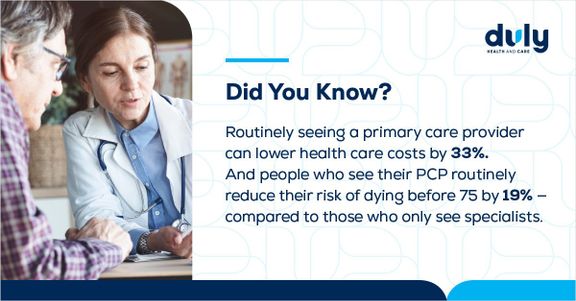Do you ever wonder why you need a primary care physician (PCP)?
Does making an appointment for your annual exam feel like just one more thing to check off your list?
Do you wonder why establishing care is necessary?

When it comes to deciding if you really need a PCP, the short answer is yes. They can have a big impact on your health, and they can be an important resource to have throughout your life.
Here are 7 benefits of seeing a PCP at least once a year.
1. Provide preventative care and health education.
One of the most important services a PCP can offer is preventative care. Seeing a PCP at least once yearly for wellness exams helps ensure that you are up-to-date on recommended tests, screenings, and vaccinations. Often, these services aid in prevention and early detection of major health conditions such as diabetes, heart disease, and high blood pressure. Preventing these conditions and promoting a healthy lifestyle will help to create a stronger, more vibrant you.
2. Be there when you get sick.
When you come down with an illness or injury, it’s comforting to have someone on hand who knows you and your history. Your PCP is there to help you through your sickness by providing necessary testing and treatment options. They can also provide follow-up, answering any questions or concerns you may have about your illness after you leave the office.
3. Catch health concerns early.
Having a PCP comes in handy not only when you have an acute illness – but they can also provide long-term health benefits. Yearly check-ups with your PCP will ensure that you have the necessary screenings (such as a mammogram or colonoscopy) to help catch treatable medical conditions early. Your PCP will also confirm that your health screenings are tailored to you specifically – knowing your personal and family history can allow them to determine if there are any other tests that are necessary to safeguard your future health.
Make your annual wellness visit a priority by finding a Primary Care Provider or making an appointment with yours today.
4. Prescribe and manage your medications.
If you have any chronic medical conditions, you and your PCP can work together to create the best plan of care. They will make sure that you are on the appropriate medications and treatment plan. They will also continue to monitor your health over time and advise any other options if needed. Your PCP can also serve as a resource for any questions that you have as they join you on your journey toward a healthier you.
5. Make referrals to specialists.
For those health conditions that require more specialized care, your PCP can offer referrals to the appropriate specialists. Your PCP can then follow up with any recommendations offered by the specialists. Several common referrals your PCP can make include physical therapy, cardiology, gastroenterology, surgery, or dermatology.
6. Coordinate your care.
You may have several health conditions that require the services of a specialist, which can become difficult to balance. As your health becomes more complex, your care team often grows to include multiple specialists. Your PCP often becomes the go-between, coordinating with multiple specialists and professionals to ensure that your treatment plans are streamlined and effective. It can be comforting to know that someone who knows your story and with whom you have built a relationship is at the heart of your care team.
7. Mental health support.
Lasting health and wellness includes not only supporting peak physical health – but also includes your mental health as well. Developing a relationship with a PCP you can trust will help ensure that all aspects of your wellness are addressed. Your PCP can help with self-care suggestions, stress relief tips, and treatment for any mental health conditions as needed. Your PCP is there to support you in your journey to become the best version of yourself – physically and mentally.
Find a Primary Care Provider Today
Even if you haven’t seen yours in a while (or don’t have a PCP at all), it’s never too late to find a provider and start seeing them on a regular basis. You can find a provider online and search by specialty, location, and even availability.
A primary care physician doesn’t just have to be another faceless doctor who you see and immediately forget. They can be an important part of your health team and journey. When you see the same person over many years, you can build a strong relationship and have confidence in the care you receive.
Health Topics:







